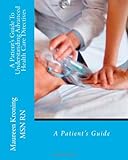If you're new here, you may want to subscribe to my RSS feed. Thanks for visiting!
Any competent adult has the right to accept and/or refuse any medical treatment.
Doctors are only allowed to tell patients the pros and cons of treatment, they can offer advice, they can not order a patient to accept treatment. The problems start when the individual can no longer communicate or is no longer considered mentally competent enough to make their own decisions.
When this happens other people step in and try to decide what type of medical treatment the person would want for themselves.
Most of us like to believe that we will live long full lives and always be in complete control of our fate. But in reality, this is not always the case. People are injured in car accidents, freak falls and have brains that are slipping further and further into oblivion as a direct result of mental illness.
When this happens we loose control over the medical treatment that we always took for granted.
Health care proxies, advanced health care directives, and living wills are documents that are drafted before a patient looses their mental competency that clearly state what type of medical treatment the patient will accept in a given situation and what type of treatment they wont accept.
Doctors are required to work within the boundaries of advanced health care directives, living wills, and health care proxies.
An advanced health care directive is a document that is signed when the person is competent stating their health care desires.
One type of advanced health care directive people like to use is durable power of attorney for health care. A person with durable power of attorney is a person that has been named by the patient as having the right to make all medical decisions.
This person is called a patient advocate. Any mentally competent person over the age of eighteen can be given power of attorney. Before you name someone as your patient advocate make sure they are comfortable with the responsibility they are being given. Make sure that they have a very firm understanding of your medical wishes and desires.
A patient advocate can be a friend, spouse, family member, life partner or lawyer. They should be someone that you can literally trust with your life. If you do not name a person as your patient advocate the responsibility will automatically go to your closest family member. A patient advocate can only act if you are unable to communicate for yourself.
A second popular type of advanced health care directive is a living will. A living will is a document where you state you health care wishes in writing. Living wills do not name a patient advocate.
If you choose to write a living will, you need to decide if you are willing to be hooked up to a ventilator, if you want to be resuscitated if your heart stops, if you want life prolonging drugs, are there any types of surgeries you do not want to have performed on your body, if you are in a coma do you want to have a feeding tube inserted. These are all very important decisions to be made.
If you are in a coma and the doctors feel that you will never wake up, do you want them to take any steps that will keep your body alive?
Living wills are where most people list the times they want to be resuscitated and the times they don?t want to be resuscitated.
If you have a living will you should keep it somewhere safe that it can be easily found in a medical emergency. Some people keep them in their wallets or purses and others choose to register them in a national database. Many people keep them someplace in their home, while other people choose to put them in a safe deposit box.

Living Wills & Health Care Proxies: Assuring That Your End-of-Life Decisions Are Respected
by: Martin M. Shenkman
publisher: Law Made Easy Press, LLC, published: 2004-02-20
ASIN: 0974806803
EAN: 9780974806808
sales rank: 2407170
price: $110.99 (new), $16.77 (used)
Practical steps everyone can take to assure that their end of life decisions are respected. Includes a discussion of legal, medical, religious and other issues. Detailed explanations of living wills, health care proxies, emergency child medical forms, guardianships, and more. Sample forms are provided.

The Challenge of Applying Advance Directives in Hospital Practice
by: Muriel R. Gillick
publisher: JTE Multimedia, published: 2011-04-18
ASIN: B004X7PYKC
sales rank: 939072
Critically ill elderly patients facing crucial decisions about their future medical treatment routinely come under the care of hospital physicians who may have no previous relationship with them or their families. The majority of patients for whom this sort of decision must be made are unable to participate in decision making because of dementia, delirium, or both. They are desperately ill, often with a new medical problem with which they have had little time to come to terms. Hospital physicians must rely on advance directives?either a living will, health care proxy, or both?to make decisions. Translating advance directives into practice is a challenging and complex process that is best approached carefully and systematically.

A Patient Guide To Understanding Advanced Health Care Directives
by: Maureen Kroning MSN RN
publisher: CreateSpace, published: 2011-09-06
ASIN: 1466214511
EAN: 9781466214514
sales rank: 380828
price: $9.23 (new)
This guide is designed to assist both doctors and nurses to provide Advanced Health Care Directives (AHCD) education to their patients, families and communities.

Living Trusts for Everyone: Why a Will is Not the Way to Avoid Probate, Protect Heirs, and Settle Estates
by: Ronald Farrington Sharp
publisher: Allworth Press, published: 2010-03-09
ASIN: 158115674X
EAN: 9781581156744
sales rank: 163123
price: $8.64 (new), $8.55 (used)
The misconceptions surrounding the last will and testament need to be put to rest: Wills benefit lawyers. Trusts benefit you. Period. Too often lawyers sell wills to clients only to sit back and wait to sell their probate services to their client? s heirs. Modern estate planning should utilize the Living Trust as the effective, efficient, and inexpensive alternative to a will. Living Trusts for Everyone: Why a Will is Not the Way to Avoid Probate, Protect Heirs, and Settle explains why wills are not the best way to handle an estate and details the many advantages trusts have over wills in not only eliminating probate, but protecting your assets for your heirs. Anyone with minor children, disabled beneficiaries, blended families, or spendthrift heirs must have a trust to be sure the assets left behind are put to good use, and that your intentions are carried out. Lawyers may have vested interests in perpetuating the probate system, but this book will explain why legal services are not needed to do the clerical work in settling a trust after death. No legal jargon or confusing double-speak, just specific step-by-step instructions and sample form letters to settle a trust are included to take the mystery out of the process. This is not a do-it-yourself book and it doesn?t try to cram every type of trust onto its pages. Living Trusts for Everyone explains in specific terms what benefit a trust will have for you and gives you the tools to settle a loved one?s trust with no lawyers and no expense. For those who already have a trust, there is a list of what to look for to see if your trust is any good, or if it needs to be updated. Trust seminars are examined with warnings on what to look out for in setting up your trust. Everyone who cares about what happens to their assets at death should read Living Trusts for Everyone: Why a Will is Not the Way to Avoid Probate, Protect Heirs, and Settle!
Bernie Krooks: Health Care Proxy
Bernie Krooks talks about the importance of a Health Care Proxy.
CMA presents Advance Health Care Directive
An Advance Health Care Directive is the best way to make sure that your health care wishes are known and considered if for any reason you are unable to speak for yourself. By completing a form called an ?Advance Health Care Directive? California law allows you to appoint another person to be your health care ?agent.? This person (who may also be known as your ?attorney-in-fact?)will have legal authority to make decisions about your medical care if you become unable to make these decisions for yourself. A message from the California Medical Association.
Estate Planning : Purpose of a Living Will
A living will, or advance directive, gives a named person the ability to ?pull the plug? in some medical instances. Learn the purpose of a living will from an estate planning and probate lawyer in this free video on estate law. Expert: Brad Wiewel Contact: www.texastrustlaw.com Bio: Brad Wiewel is board certified in estate planning and probate by the Texas Board of Legal Specialization and has been practicing law since 1978. Filmmaker: Demand Media
los angeles kings earth day timothy leary jonathan frid pujols watchmen hitch
No comments:
Post a Comment
Note: Only a member of this blog may post a comment.